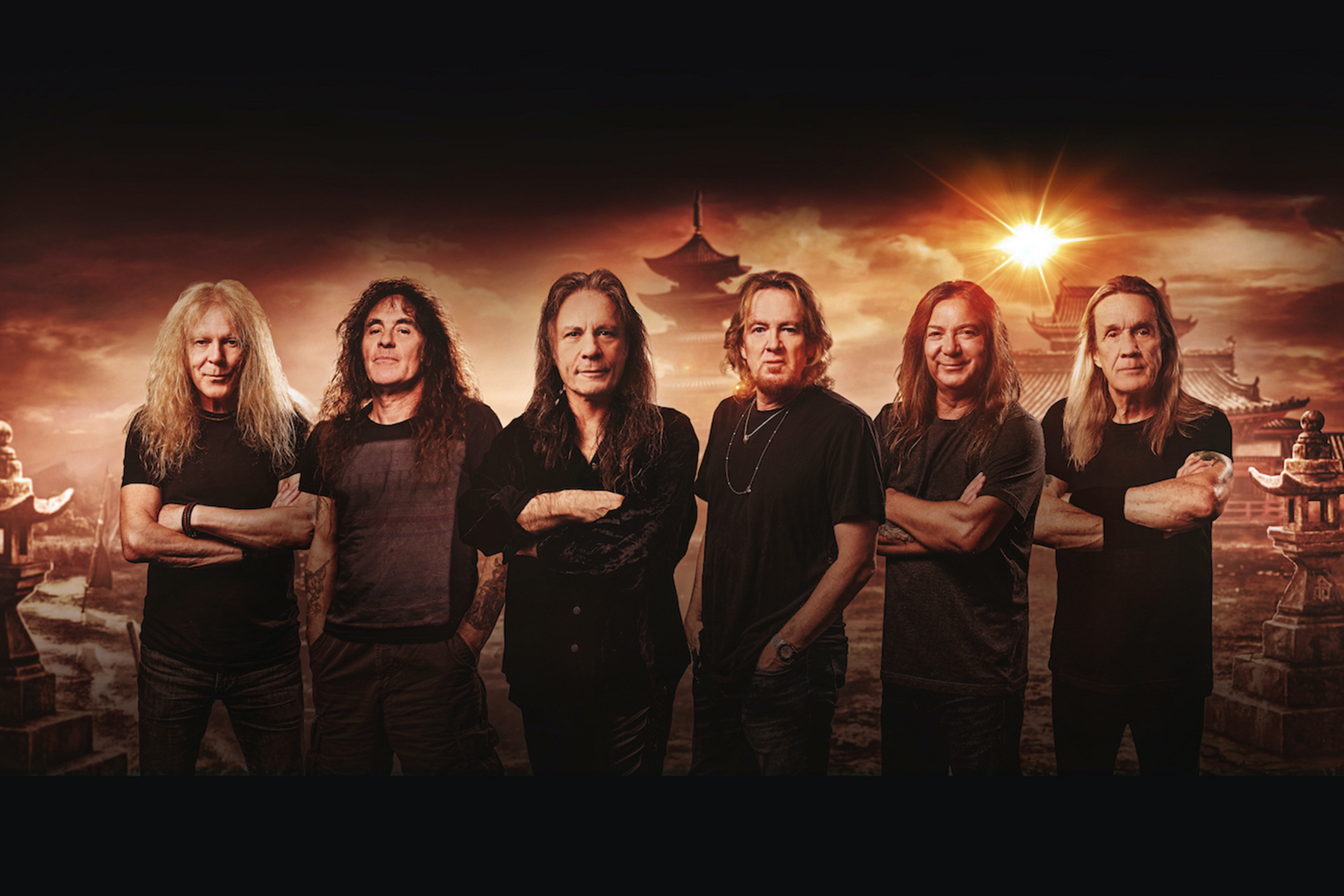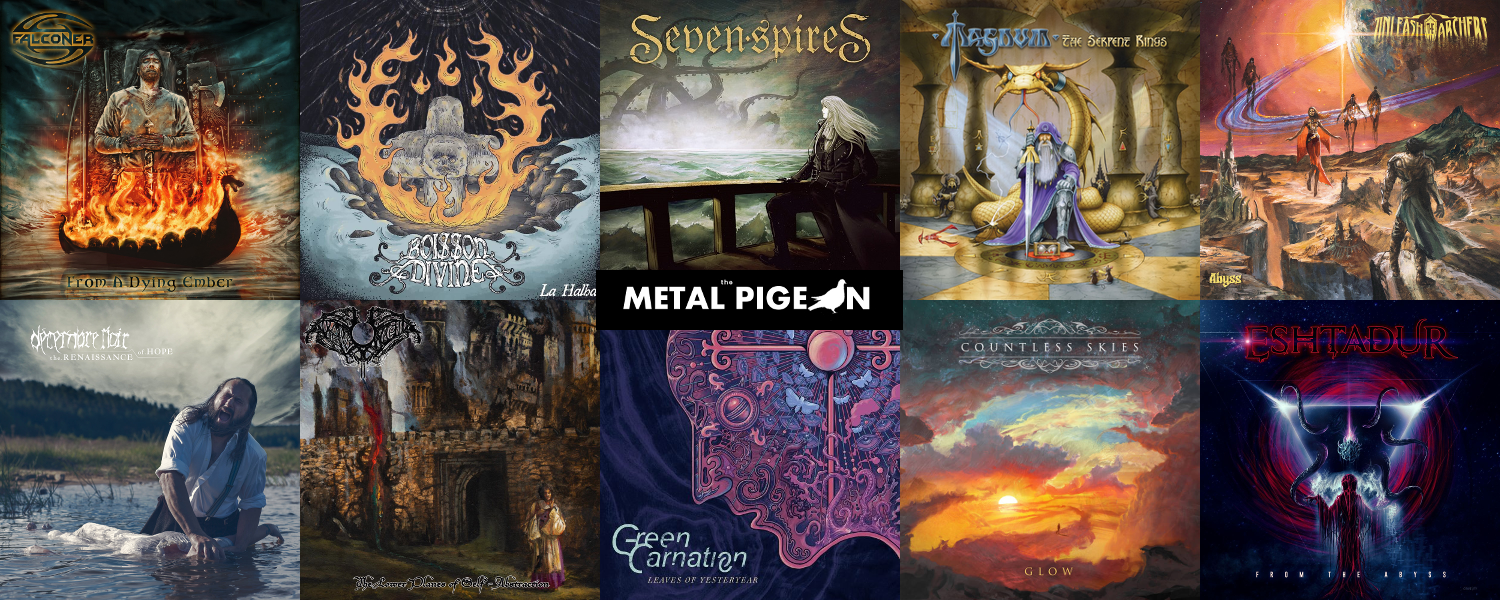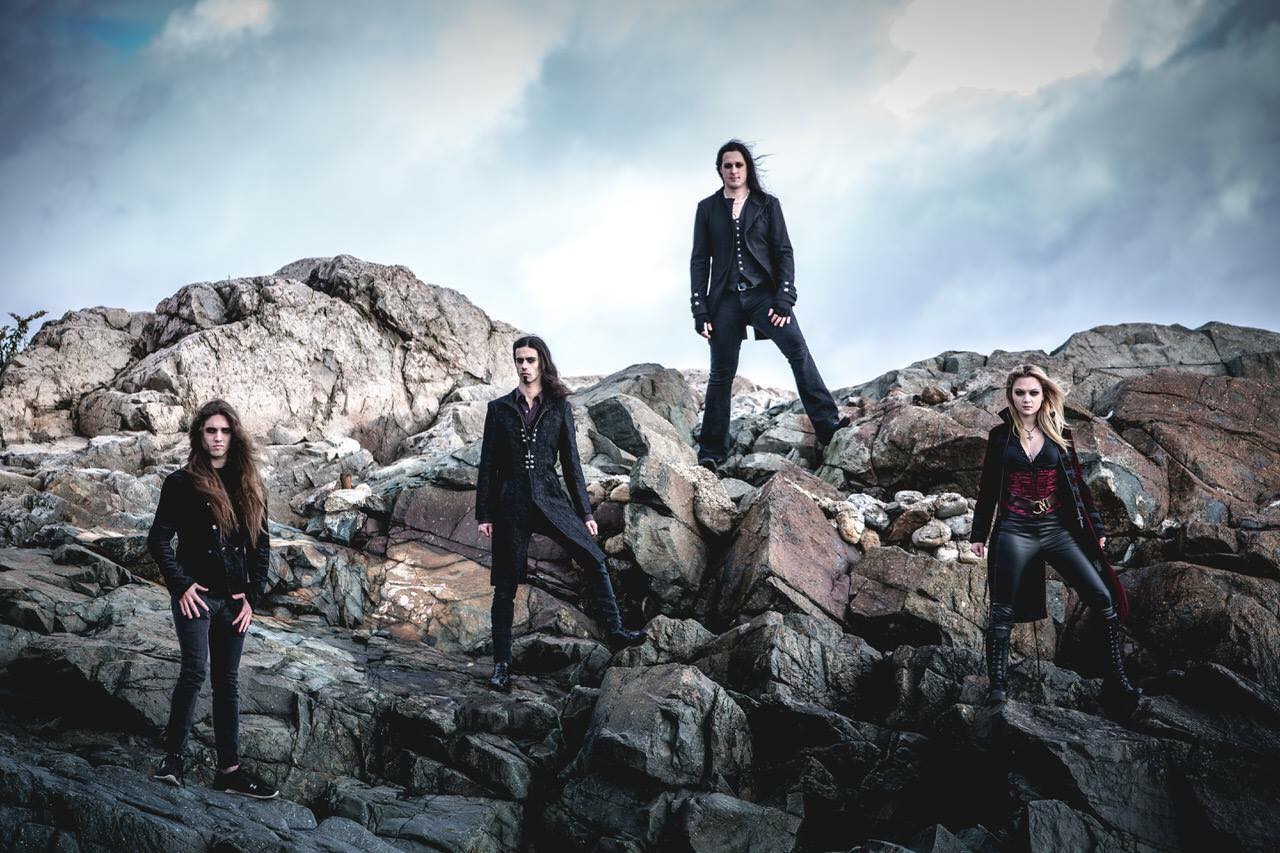I have to admit to being slightly taken aback by just how strong the start to this year has been metal-wise. This is because normally, release calendars get off to a slow, lurching start in the first few wintry months of any year, and only really get frenetic around the springtime, which allows us lazier listeners to dilly dally for awhile in the wake of the post year-end best-of list publishing where we listen to a ton of old stuff or nothing at all. I consider myself lucky in that knowing a bunch of friends who are even more intense about their metal listening than I am yields a handful of best of lists worth delving into, which I’ve been doing diligently through most of these first few weeks. And to that point, normally the first article of the year is a mea culpa talking about all the stuff I’ve missed the year prior, but you know what — I can’t afford to that do this time around because there is so much genuinely exciting new stuff coming out that I owe it to myself to sort out my thoughts on all of it here. So here are some scattered thoughts on a plethora of new things and other odds and ends that have been top of mind recently:
Saor – Amidst the Ruins:

Having lapsed on release date awareness recently, I was happily surprised that Andy Marshall was rewarding my late December and early January constant spins of Forgotten Paths and Origins with a new Saor album. Going into this I had only expectations for the quality of the compositions, because there’s a standard that Marshall had set over the entire discography of the project that was largely characterized by thoughtfulness, depth, and a conveying of emotion. That latter dimension has been one that shifts, because I’d imagine that no one could argue against the idea that Origins (a year end listee in 2022) was strikingly more euphoric in tone than its immediate predecessor. Now while opinions are mixed about that change in tone, I personally loved it and wouldn’t have minded if he continued that trajectory. But credit to Marshall, he pivoted away from it a touch on Amidst the Ruins, which is indeed a darker, more earthen toned album in the vein of Forgotten Paths, though with the added spice of some smoky mysticism, as heard in the striking single “The Sylvan Embrace”. But not entirely, because on “Rebirth”, we get some of those clear eyed lead guitars combined with ringing bagpipes and it gives major Origins vibes. In re-listening to the album just now, I feel the takeaway here is that it’s a combination of moods from the past few records, a sort of career summary in a way, and that’s not a bad thing. I do love it, and though it lacks a transcendent moment such in the extended guitar solo of “Aurora”, its likely to stick in the listening rotation throughout the year.
The Halo Effect – March of the Unheard:

I feel like the general consensus about The Halo Effect’s first album has over the past three years gradually caught up to the opinion that I had of it upon its release, that it sounded far too much like Dark Tranquility for its own good. Sure there were elements of Jesper Stromblad’s signature touch on guitars and the songwriting was at times pretty solid, but Mikael Stanne’s position at the vocal helm was that double edged sword of him being a really fantastic screamer with incredible tone, and yet someone who has had years of developing a clean vocal melody style that is unmistakably recognizable. So recognizable in fact that it was hard to shake the Dark Tranquility vibes leaching into The Halo Effect’s music, particularly when it was largely a mix of scream/clean balancing acts within the songs, a trait that characterized so many of the recent albums of his main band. So on the sequel, they seem to have either heard the criticism and are consciously responding to it, or Jesper has seemingly decided to interject more of his signature guitarwork approach to the band’s sound, because there is a convincing aspect to March of the Unheard that is classic Gothenburg melodeath in terms of pure sound. For that reason alone, I enjoy this album a great deal when I’m actively listening to it, because its hitting those same taste buds that were awakened when I first heard classic In Flames and the rest of the Gothenburg ilk. But I will offer this criticism, that after weeks of listening to this consistently, I still have a hard time identifying most of these songs individually, as they all blur together in this modern melodeath mélange, and that’s been my criticism of Dark Tranquility’s newer albums as well. And I hate piling on Mr. Stanne, because I think he’s a great vocalist, but perhaps he needs guiderails for this project, such as a declarative rule on no clean singing, or no vocal melody driven choruses allowed? A little more Majesties’ Vast Reaches Unclaimed and less Atoma or Endtime Signals would really go a long way.
Majestica – Powertrain:

A fun one from a band led by one Tommy Johansson (ex-Sabaton/ReinXeed) who is in his power metal element here. I have a fond regard for anyone proudly flying the flag of classic power metal (the non-meme sort that is), and Tommy loudly declares that pride on an album that is a natural progression from their 2019 debut Above the Sky and sophomore x-mas concept album A Christmas Carol (if we’re counting that as a regular album I suppose). It also doubles as a tribute to power metal in subtle and not so subtle ways, the latter coming in the form of a unabashed salute to fellow Swedes in Hammerfall on “Megatrue”, with lyrics invoking that band’s album and song titles to amusing effect (well, to us power metal nerds), set to a suitably Hammerfall-ian marching song structure. I hear a little nod towards “Full Moon” ala Sonata Arctica on “No Pain, No Gain”, not only in the keyboards, but in the vocal patterning that does have hints of Tony Kakko. I hear Power Quest on “Victorius” with splashes of Stratovarius, and major Heavenly vibes on “Go Higher” — but alas, I trust that the band didn’t want us to only take away comparisons from this album. On “A Story In the Night”, they unleash a beast of a song that is unmistakably cut from the ReinXeed/Majestica songwriting mold, easily their finest tune to date and one to likely land on the songs of the year candidate list at least. Along with fellow Swede Johannes Skyblazer, Tommy has become one of the leading lights in a resurgence of unabashedly Europower oriented power metal, unafraid of being unfashionable and gimmick free. Its refreshing.
Dawn of Solace – Affliction Vortex:

Really impressed with the new Dawn of Solace, this being Tuomas Saukkonen’s other other band (that second ‘other’ is referring to Before the Dawn, who he brought back from the dead last year with a new singer onboard, that dude from The Voice of Finland reality show), and if that name is still not ringing a clear bell in your head, he’s the main man behind Wolfheart. So with this other band of his, it leans towards less aggression, and more of a focus on Finland’s ongoing love affair with melodic doom through a gothic filter. A two man lineup, Saukkonen’s always excellent harshes are paired against Mikko Heikkilä’s clean vocals, who is a bit of an acquired taste admittedly. He reminds me a lot of Tuomas Tuominen who gothic metal fans might remember as the vocalist on the first two The Man-Eating Tree albums and all those Fall of the Leafe records, sharing a similar tone and cadence in their deliveries. This is a moody, patience requiring affair, with songs that aren’t shy about gradual builds, slower tempos (that doom influence), and payoffs that aren’t hook based. It is a demanding listening experience in that regard, but I keep coming back to it for the depth and raw emotion they’ve mined here. I think if you’re a die-hard aggressive Wolfheart fan, this might be a fifty-fifty proposition, but if you like Finnish gothic metal this might be close enough to pique your interest.
The Night Flight Orchestra – Give Us The Moon:

I should also mention the new album from The Night Flight Orchestra, Give Us The Moon, which continues their locked into 1985 stylistic direction that they’d been splashing around in for the past two albums. I will say this, on one hand, there are some really solid songs here, “Like the Beating Of A Heart” is the band’s best single in ages and “Paloma” is a rather creative take on power balladry (deep pulls from Foreigner’s brand of AOR here) — but on the other hand, I feel like the band is treading familiar ground here that was already covered ad nauseum on the two Aeromantic albums that preceded this. There was a point where it seemed like the band was progressing their sound according to the timeline of the 80s, starting off with their debut album reflecting 1980 or 81, and each successive album moving along with the stylistic shifts in sound that actually occurred in that decade. Now I’m not so sure, maybe they just like this particular mid-80s aesthetic so much they’ve decided to nest here, but I do feel like their sound needs a shakeup. My vote would be to inject some late 80s glam/pop metal vibrancy into the mix on the next album, a little Whitesnake or Europe-ian over the top dramatic flair and some more virtuosic guitarwork. I can only hope anyway.
There were a handful of other releases that I’ll briefly comment on, starting with Master Sword’s Toying With Time being a really stellar listen, and if you heard the recent episode of the MSRcast, you’ll have heard us realizing during recording that it was the band’s final album, as they broke up immediately after its release, which does dampen the mood a bit. Give it a shot though because its a really unique blend of styles, a raspy, deep toned talented vocalist in Lily Hoy, and The Legend of Zelda as lyrical inspiration (a cousin to Fierce Deity in some ways). Italy’s Labyrinth also returned with their first album in four years, In the Vanishing Echoes of Goodbye, and it’s a solid effort that I enjoyed to a certain extent. I will concede that it didn’t have quite the punch of 2021’s Welcome to the Absurd Circus where they leaned more towards classic melodic power metal. Here I get more a progressive vibe, big on dense riff sequences and less on the soaring melodies leading the way, although Roberto Tiranti does go wild on a couple songs. I guess I’m still on the fence about my overall feelings on this album, and it very well might be a grower that hopefully sticks with me through the year.
Elsewhere, there was obviously the new Dream Theater album Parasomnia with Portnoy back in the fold, and while it was alright, I did find that “Bend the Clock” was the most interesting thing they’ve done in ages, a song genuinely brimming with some emotion and a above average vocal from James Labrie. I love the first minute and a half of that song where its such a Steven Wilson/Porcupine Tree vibe that’s happening, with undertones of nostalgia and melancholy… ahhh, if only more of their stuff could be like this I’d be a fan of this band. I listened out of curiosity and didn’t regret it, but probably will only return to that song alone. And the new Dynazty album Game of Faces came out and damn if I can find anything remarkable about it, which makes me sad actually. I don’t know if its just a me problem or that the band has started to repeat themselves, but this all sounds like stuff I’ve heard before, just less catchy. I like Nils Molin quite a bit as a vocalist for this band (unlike in Amaranthe, my criticism of him there should be well documented by now) so this is a total drag for me, so to curb my sadness I’ll end my comments here.
I can’t say that I enjoyed much of Marko Hietala’s solo album Roses From the Deep, but I applaud him getting back out there after dabbling around the metal scene with some solo guest appearances (including a cracking one with Therion on the first Leviathan album in 2021). This has much more in common with Tarot than Nightwish of course, but its so all over the place stylistically that it fell victim to a classic solo album faux pas of not having a cohesive vision. It was more Balls to Picasso and less The Chemical Wedding so to speak. There’s a new Lacuna Coil album out called Sleepless Empire, and I think its solid for what it is, though its back to their more slick, polished direction as opposed to the surprisingly dark and heavy affair that made 2019’s Black Anima very compelling. Cristina Scabbia still sounds ageless to her credit, and they have a sound that works for them, and there are songs on here such as “In Nomine Patris” and “Never Dawn” that are incredibly strong despite the thick production gloss. I do think getting messier and darker with their sound is the way for them to lean, but maybe that’s not an opinion shared by their fans.

I’m still digging into the new Ebonheart, Arion, Kilmara (love that track Daniel Heiman guests on), and Prehistoria albums, as well as Udo’s guest loaded Balls To The Wall – Reloaded, and new The Ferrymen album. I’ll probably leave those to the podcast to talk about because they’ll be old news by the time I’m caught up. Lastly, I’ll mention that I caught my first show of the year this past Sunday at the small room of House of Blues Houston, for Swallow the Sun with Harakiri For the Sky and Ghost Bath and a darkwave opener called Snakes of Russia. Regarding the latter, with all due respect to the singular gentleman who is that artist, darkwave as a live experience is profoundly boring if you don’t have some kind of visual aid to accompany it. At a certain point, I looked around and noticed people staring at their phones or like myself, the floor. His music was fine, it all kinda sounded the same, but would be great background music for working on something, but someone needs to whisper to him about reconsidering it as a live proposition. Ghost Bath were alright, apparently I forgot everything about seeing them in a gig long past, but what struck me this time was their proclamation that they play “rock n’ roll about killing yourself”, and then proceeded to do a black metal era Tribulation imitation for their set. A friend asked after the show, “Are they ashamed of black metal?”. And that was a legit question that hung in the air.
Seeing Harakiri For the Sky was a longtime coming after becoming a fan of the band back in 2018 with Arson, and they did play “Fire, Walk With Me” from that album, but mostly focused on the new one which I’m not as into. The drummer was phenomenal, and of course Matthias Sollak was incredible on lead guitar, and while they aren’t the most engaging live band, they managed to translate what is an incredibly dense, layered sound into the live setting rather well. As for Swallow the Sun, this was maybe my seventh or eighth time seeing them live now, and it was just as excellent as any of them have been (2019 was special for seeing Juha Ravio for the first time since his live hiatus). Hearing the new songs from Shining that I was obsessed with last year was a joy to behold, and they sounded heavier and more bruising than on the record (for anyone who had issues with their production). Also attending the show were Seven Spires’ Adrienne Cowan and Jack Kosto, and I got to talk to both of them outside briefly before Swallow the Sun went on. Jack was in town working on new music with Adrienne, and she told me she was leaving for the Avantasia tour the next day. I’d met both of them before, in fact Adrienne has become a common sight at specific Houston metal gigs over the past few years, but it was still surreal to look to my left during the Swallow the Sun set and see both of them standing next to us, nodding their heads along.
And that catches us up on current metal releases and events, for the most part. Anything that’s not covered in this update will be discussed on the podcast. Hopefully we get a bit of a slowdown in noteworthy releases so I can focus on some other things worth talking about on the blog, but if not, I’ll be back with one of these catch up type updates again. I’m going to deliver a singularly focused discussion on the new Avantasia and Brainstorm albums next, because both of those are worthy of a deeper look just by virtue of their veteran standing and my unabashed love for both of them. I have many thoughts!






















